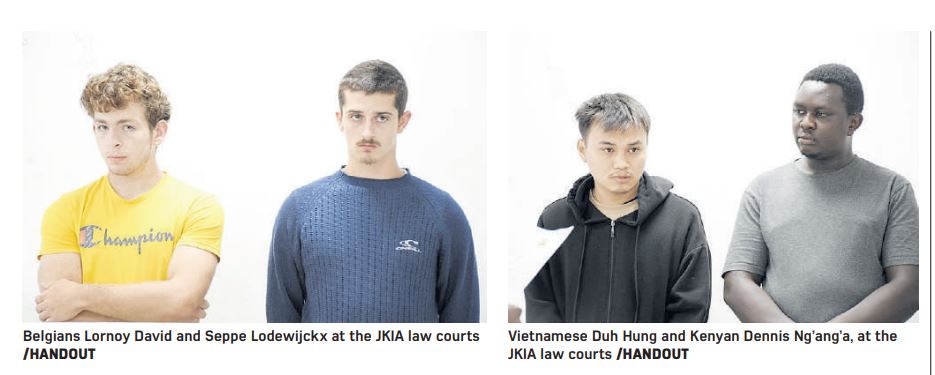
The case involving smuggling of garden ants through Jomo Kenyatta International Airport was on Tuesday adjourned to April 23 for mention.
The court will on the mention date receive the pre-sentencing report from the probation officer, expert opinions from the National Museums of Kenya and the Kenya Wildlife Service.
It will also confirm that all three reports have been duly filed before the court proceeds. The four suspects will in the meantime be detained at the Lang'ata police station, the court ruled.
This case highlights Kenya’s commitment to combating illegal wildlife trafficking and biopiracy as well as protecting priceless biodiversity.
The prosecution led by Allen Mulama and Paula Rono told the court that Belgians Lornoy David and Seppe Lodewijckx were arrested on April 5 at around 10am at Jane Guest House in the Lake View area of Naivasha, Nakuru County.
The two were found in possession of approximately 5,000 live queen ants stored in 2,244 tubes, with an estimated street value of Sh1 million.
They were charged with dealing in wildlife species without a permit, contrary to Section 95(c) of the Wildlife Conservation and Management Act, Cap 376.
In a separate but related case, Vietnamese Duh Hung Nguyen and Kenyan Dennis Ng’ang’a were charged with illegal possession and trade of around 400 live queen ants, valued at Sh200,000.
The offense is reported to have occurred between the April 5 and April 6 at Hemak Towers Suite in Nairobi’s Central Business District and Tofina Muthama apartments in Syokimau. All four accused appeared before senior principal magistrate Njeri Thuku and entered guilty pleas. The magistrate on Tuesday ruled the case will be mentioned on April 23.
The families of the accused were in court. The arrests were made after authorities intercepted live queen ants concealed in specially modified test tubes and syringes.
Investigations revealed that the test tubes had been designed to sustain the ants for up to two months and evade airport security. Cotton wool was used to maintain the ants’ survival during transit, indicating a premeditated and well-executed trafficking operation.
The suspects entered Kenya on tourist visas and, according to intelligence reports, intended to smuggle the ants to high-value exotic pet markets in Europe and Asia, where demand for rare insect species is rising. The intercepted ants, particularly the highly sought-after Messor cephalotes, are prized by collectors for their unique behaviour, complex colony-building capabilities and greenhouse pest control.
These traits make them popular in formicariums—artificial ant habitats—driving their illicit trade and illegal removal from the wild.
Biopiracy refers to the commercial exploitation or export of biological materials—such as plants, animals, and microorganisms—without fair compensation or benefit-sharing with the country of origin.
In this instance, the unauthorized collection and export of Messor cephalotes not only undermines Kenya’s sovereign rights over its biodiversity but also deprives local communities and research institutions of potential ecological and economic benefits, including biopiracy. As a signatory to the Nagoya Protocol, Kenya mandates prior informed consent and equitable benefit-sharing for any access to its genetic resources. The illicit actions of the suspects bypassed these legal and ethical requirements, constituting a double offense of wildlife trafficking and biopiracy.













